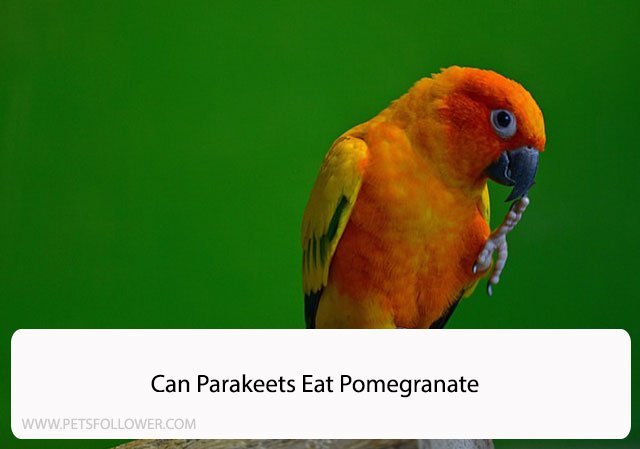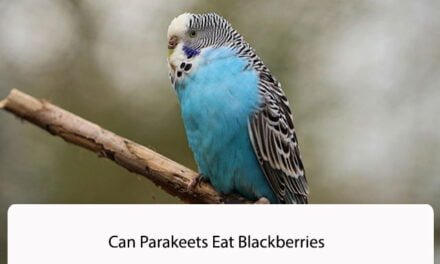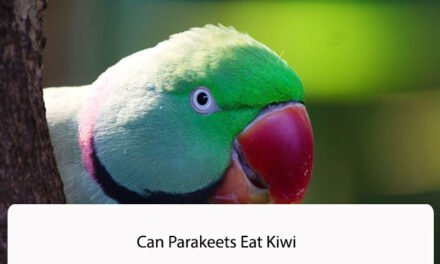Parakeets are a popular pet bird species that are known for their colorful feathers and cheerful personalities. As a responsible pet owner, it is important to ensure that your feathered friend is receiving a balanced and nutritious diet. While many fruits and vegetables are safe for parakeets to consume, it is important to research and understand which foods are appropriate for your bird’s health.
One fruit that may catch your eye at the grocery store is the pomegranate. Known for its sweet and tangy flavor, pomegranates are a good source of vitamins and antioxidants. But can parakeets eat pomegranate? In this article, we will explore whether or not pomegranates are a safe and healthy addition to your parakeet’s diet.
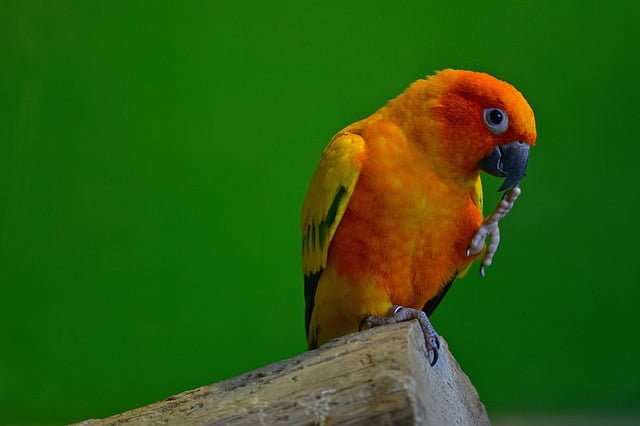
Understanding Parakeets’ Dietary Needs
When it comes to feeding our parakeets, it’s essential to understand their dietary needs. Parakeets are small birds that require a balanced diet to maintain their health and well-being. A poor diet can lead to health problems, such as obesity, malnutrition, and even death.
Parakeets are omnivores, which means they eat both plant and animal-based foods. In the wild, they feed on a variety of foods, including seeds, fruits, insects, and nectar. As pet owners, it’s our responsibility to provide them with a balanced diet that mimics their natural diet as much as possible.
A balanced diet for parakeets should consist of:
- Fresh fruits and vegetables: These should make up about 20% of their diet. Some good options include spinach, broccoli, carrots, and apples.
- High-quality seed mix: This should make up about 60% of their diet. Look for a mix that includes a variety of seeds, such as millet, canary seed, and sunflower seeds.
- Pellets: These should make up about 20% of their diet. Look for high-quality pellets that are specifically formulated for parakeets.
It’s important to note that parakeets should not be fed a diet that consists solely of seeds. While seeds are a crucial part of their diet, they do not provide all of the necessary nutrients that parakeets need to stay healthy.
In summary, a balanced diet that includes fresh fruits and vegetables, high-quality seed mix, and pellets is essential for the health and well-being of our parakeets. By providing them with a varied diet that mimics their natural diet, we can help ensure that they live long and healthy lives.
Pomegranate: A Nutritional Overview
Pomegranates are a delicious fruit that are packed with nutrients. They are a good source of fiber, vitamins C and K, and potassium. In fact, one pomegranate contains about 7 grams of fiber, which is about 28% of the recommended daily intake.
Pomegranates are also rich in antioxidants, which are important for protecting our cells from damage caused by free radicals. One of the antioxidants found in pomegranates is punicalagin, which is unique to this fruit. Studies have shown that punicalagin has potent antioxidant and anti-inflammatory properties.
In addition to their antioxidant content, pomegranates also contain a variety of other beneficial compounds. For example, they are a good source of ellagic acid, which has been shown to have anti-cancer properties. Pomegranates also contain flavonoids, which are plant compounds that have been linked to a reduced risk of heart disease.
Overall, pomegranates are a nutritious fruit that can be a great addition to your diet. They are low in calories and high in fiber, making them a great option for those looking to maintain a healthy weight. Plus, their high antioxidant content makes them a great choice for protecting your cells from damage.
Can Parakeets Eat Pomegranate?
Pomegranate is a nutritious fruit that is rich in vitamins and antioxidants. As pet owners, we might be curious about whether our feathered friends can enjoy the same benefits from this fruit as we do. In this section, we will discuss whether parakeets can eat pomegranate and if it is safe for them.
Firstly, it is important to note that parakeets are omnivores and can eat a variety of fruits and vegetables. Pomegranate can be a healthy addition to their diet in moderation. However, it should not be the only fruit they consume as it lacks certain nutrients that are essential for their health.
When feeding pomegranate to parakeets, it is important to remove the seeds as they can be a choking hazard. Additionally, the fruit should be washed thoroughly to remove any pesticides or chemicals that may be harmful to the bird.
It is also important to note that some parakeets may not like the taste of pomegranate. If this is the case, there is no need to force them to eat it. It is always best to offer a variety of fruits and vegetables to ensure they receive a balanced diet.
In conclusion, parakeets can eat pomegranate as long as it is given in moderation and prepared properly. It is always best to consult with a veterinarian before introducing any new food to your pet’s diet.
Benefits of Pomegranate for Parakeets
Pomegranate is a nutritious fruit that can be a healthy addition to your parakeet’s diet. Here are some of the benefits of pomegranate for parakeets:
Antioxidant Properties
Pomegranate is rich in antioxidants, which can help protect your parakeet’s cells from damage caused by free radicals. Free radicals are unstable molecules that can damage cells and contribute to aging and disease. By providing your parakeet with antioxidants, you can help support their overall health and well-being.
Hydration Benefits
Pomegranate is also a good source of hydration for parakeets. The fruit is high in water content, which can help keep your parakeet hydrated and prevent dehydration. Dehydration can be a serious health concern for parakeets, so it’s important to ensure that they have access to fresh water and hydrating foods like pomegranate.
Fiber Content
Pomegranate is also a good source of fiber, which can help support your parakeet’s digestive health. Fiber helps move food through the digestive system and can prevent constipation and other digestive issues. By providing your parakeet with fiber-rich foods like pomegranate, you can help keep their digestive system healthy and functioning properly.
Overall, pomegranate can be a healthy addition to your parakeet’s diet. However, it’s important to remember that pomegranate should be given in moderation and as part of a balanced diet. Too much pomegranate can lead to digestive upset or other health issues. As always, consult with your veterinarian before making any changes to your parakeet’s diet.
Potential Risks of Pomegranate for Parakeets
Sugar Content
Pomegranate is a fruit that is naturally high in sugar. While a small amount of sugar is necessary for a parakeet’s diet, too much sugar can be harmful. Excessive sugar intake can lead to obesity, diabetes, and other health problems. Therefore, it is important to feed pomegranate to your parakeet in moderation.
Seeds and Pith
The seeds and pith of pomegranate can also pose a potential risk to parakeets. The seeds are small and hard, and if ingested whole, they can cause choking or blockages in the digestive system. The pith, which is the white membrane that surrounds the seeds, can also be difficult for parakeets to digest. Ingesting too much pith can cause gastrointestinal problems.
To avoid these risks, it is recommended to remove the seeds and pith before feeding pomegranate to your parakeet. You can do this by cutting the fruit into small pieces and removing the seeds and pith with a spoon.
In summary, while pomegranate can be a nutritious and tasty treat for parakeets, it is important to feed it in moderation and remove the seeds and pith to avoid potential risks.
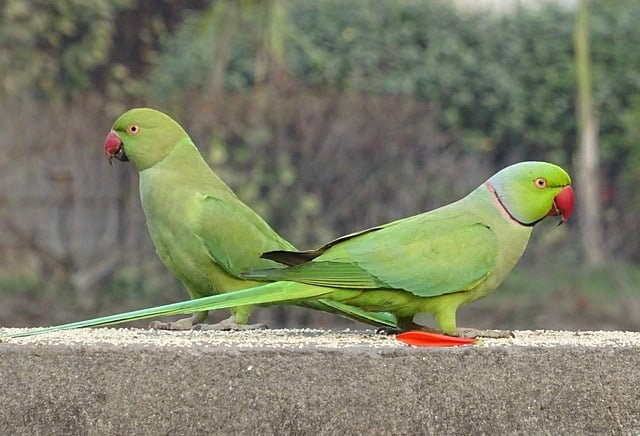
How to Feed Pomegranate to Parakeets
Portion Size
When it comes to feeding pomegranate to parakeets, it’s important to keep portion size in mind. While pomegranate can be a healthy and nutritious addition to your bird’s diet, it should be given in moderation. We recommend offering pomegranate as a treat, rather than a regular part of your bird’s diet.
A good rule of thumb is to offer no more than a few small pieces of pomegranate at a time. This will help prevent overfeeding and ensure that your bird is getting a balanced diet.
Preparation Methods
Before feeding pomegranate to your parakeet, there are a few preparation methods to consider. First, be sure to thoroughly wash the fruit to remove any dirt or debris. You may also want to remove the seeds from the fruit, as they can be difficult for birds to digest.
One easy way to prepare pomegranate for your bird is to slice it into small pieces and remove the seeds. You can then offer the fruit directly to your bird, or mix it into their regular food.
Another option is to blend the pomegranate into a puree and offer it as a treat. This can be a great way to introduce pomegranate to your bird, especially if they are hesitant to try new foods.
Overall, pomegranate can be a healthy and enjoyable treat for your parakeet when offered in moderation. By following these tips for portion size and preparation, you can ensure that your bird is getting the nutrients they need while still enjoying a tasty snack.
Alternatives to Pomegranate for Parakeets
If you’re looking for alternative fruits to feed your parakeet, there are plenty of options to choose from. Here are some fruits that are safe and healthy for your feathered friend:
- Apples: Apples are a great source of vitamins and minerals and are safe for parakeets to eat. Just make sure to remove the seeds and core before feeding them to your bird.
- Berries: Blueberries, strawberries, raspberries, and blackberries are all safe for parakeets to eat. They are a great source of antioxidants and vitamins.
- Grapes: Grapes are a good source of vitamins and minerals and are safe for parakeets to eat. Just make sure to remove the seeds before feeding them to your bird.
- Mango: Mango is a great source of vitamins and minerals and is safe for parakeets to eat. Just make sure to remove the skin and seed before feeding it to your bird.
- Melon: Watermelon, cantaloupe, and honeydew are all safe for parakeets to eat. They are a great source of vitamins and minerals.
- Oranges: Oranges are a good source of vitamin C and are safe for parakeets to eat. Just make sure to remove the seeds before feeding them to your bird.
- Papaya: Papaya is a great source of vitamins and minerals and is safe for parakeets to eat. Just make sure to remove the skin and seeds before feeding it to your bird.
Remember to always introduce new foods slowly and in small amounts to make sure your parakeet tolerates them well. And always make sure to wash fruits thoroughly before feeding them to your bird.
Conclusion
In conclusion, while pomegranates are not harmful to parakeets, they should only be given in moderation as a treat. Parakeets require a balanced diet of seeds, fruits, and vegetables to maintain their health and well-being.
It is important to note that pomegranate seeds should be removed from the fruit before serving to your parakeet, as the seeds can be a choking hazard. Additionally, parakeets may not be able to digest the tough outer layer of the pomegranate, so it is best to only offer the juicy arils to your bird.
Overall, pomegranates can be a healthy and tasty addition to your parakeet’s diet, but they should not be relied upon as a primary food source. As with any new food, it is important to introduce pomegranates gradually and monitor your bird’s reaction for any signs of digestive upset.

Frequently Asked Questions
What fruits can parakeets eat?
Parakeets can eat a variety of fruits, including apples, bananas, strawberries, grapes, and oranges. However, it’s important to remember that fruits should not make up the majority of a parakeet’s diet. They should only be given as occasional treats.
What vegetables can parakeets eat?
Parakeets can eat a variety of vegetables, including carrots, spinach, broccoli, and kale. Again, vegetables should not make up the majority of a parakeet’s diet, but they are important for providing necessary vitamins and minerals.
Can parakeets eat apples?
Yes, parakeets can eat apples. Apples are a great source of vitamins and minerals, but they should be given in moderation as too much fruit can lead to health problems.
Can parakeets eat blueberries?
Yes, parakeets can eat blueberries. Blueberries are a great source of antioxidants and vitamins, but like with all fruits, they should only be given as occasional treats.
Are pomegranate seeds safe for parakeets?
Yes, pomegranate seeds are safe for parakeets to eat. However, it’s important to remove the white membrane surrounding the seeds as it can be bitter and difficult for parakeets to digest.
What fruits and vegetables are toxic to parakeets?
Some fruits and vegetables can be toxic to parakeets, including avocado, rhubarb, and onion. It’s important to research any new food before giving it to your parakeet to ensure it is safe for them to eat.

